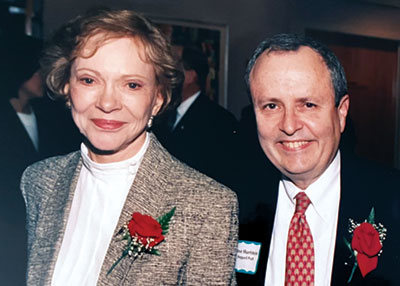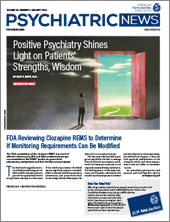For nearly 50 years, former First Lady Rosalynn Carter used her platform to champion the cause of people with mental illness, working zealously to ensure the fair and humane treatment of millions who suffer from these disorders.
She was in many ways her century’s Dorothea Dix.
Dix, the legendary advocate for better treatment of people with mental disorders, also spent nearly half a century in her relentless campaign at federal, state, and local levels. Her efforts began in the winter of 1842, when she paid a visit to a freezing Massachusetts jail and was told by the jailer, “Madam, the insane require no heat.” Her campaign led to the founding of some 32 “asylums,” not a bad word in the mid-19th century.
Mrs. Carter’s introduction to the issue came while campaigning with her husband during his bid for governor of Georgia in the early 1970s when she encountered a mother struggling to provide care for her daughter with mental illness.
She carried this passion for humane treatment from the governor’s mansion to the White House. In 1977, the President’s Commission on Mental Health—created by Jimmy Carter at Mrs. Carter’s urging—embarked on the first comprehensive review of the country’s mental health system since 1960.
At the time, I was a 35-year-old commissioned officer in the U.S. Public Health Service and served as the liaison between the National Institute of Mental Health and the White House. I watched with awe as Mrs. Carter joined the work of the commission. When the commissioners scheduled a field trip on a rented bus to see a hospital in Chicago, the Secret Service wanted Mrs. Carter to travel separately, but she refused. She spent that travel time with the commissioners getting to know them individually and urging them to be ambitious in their recommendations.
The commission’s landmark report recognized the tragedy of deinstitutionalization and called for a robust system of care to help people obtain treatment, live independently, and contribute to society.
Mrs. Carter went right to work on the creation and passage of the Mental Health Systems Act of 1980, a sweeping bill that committed federal funds to provide community-based care. The bill integrated mental health with health care and created agencies to promote patients’ rights, with a particular focus on serving the needs of those suffering from severe mental disorders.
While fighting for the legislation’s passage, Mrs. Carter testified before both houses of Congress, including before a Senate panel led by Ted Kennedy, who at the time was challenging her husband in his reelection bid. She was the first first lady to testify before Congress since Eleanor Roosevelt.
It was my job to brief her before these and other events. She was a quick, intense study, readily absorbing not just the broad strokes of the legislation, but intricate details.
When she spoke to large groups, she was wonderful, but I learned that she was a naturally shy person. As we would wait in the wings looking out at a crowd, she would turn to me and say, “Well, what do you say?” Then she would take a deep breath and utter, “Let’s go,” before walking on stage, all smiles.
The Mental Health Systems Act passed, but months later, Ronald Reagan took office and repealed most of it. That didn’t stop Mrs. Carter, however. Her most important work for mental health came after she left office.
Through The Carter Center, the nonprofit she and Jimmy Carter founded after the White House, she intensified her advocacy, fighting for the passage of the Mental Health Parity Act, which requires insurance companies to cover mental illness in the same way they cover all health problems. At various times, when the bill was in jeopardy, she stepped in to keep it alive—calling members of Congress, writing letters, giving speeches.
Year after year, she organized annual symposiums at The Carter Center that brought together mental health practitioners, advocates, and researchers from across the country to discuss a whole range of substantive issues and publish reports and calls to action. She sat through every session taking notes and, at the end of each day, took to the podium to summarize the main themes.
She gave speeches across the country to audiences large and small, inspiring them to keep fighting for their sisters, brothers, mothers, fathers, and children affected by mental illness.
Today, as people increasingly recognize depression and anxiety in themselves and others, share stories of treatment and therapy, and call for greater public investments to help people living on the streets, it is easy to forget the immense stigma that kept mental illness hidden for decades.
More than anyone in our time, Mrs. Carter brought mental health out of the shadows. She was a tireless champion for people with mental illness, an extraordinary person who leaves an extraordinary legacy for us all. ■


